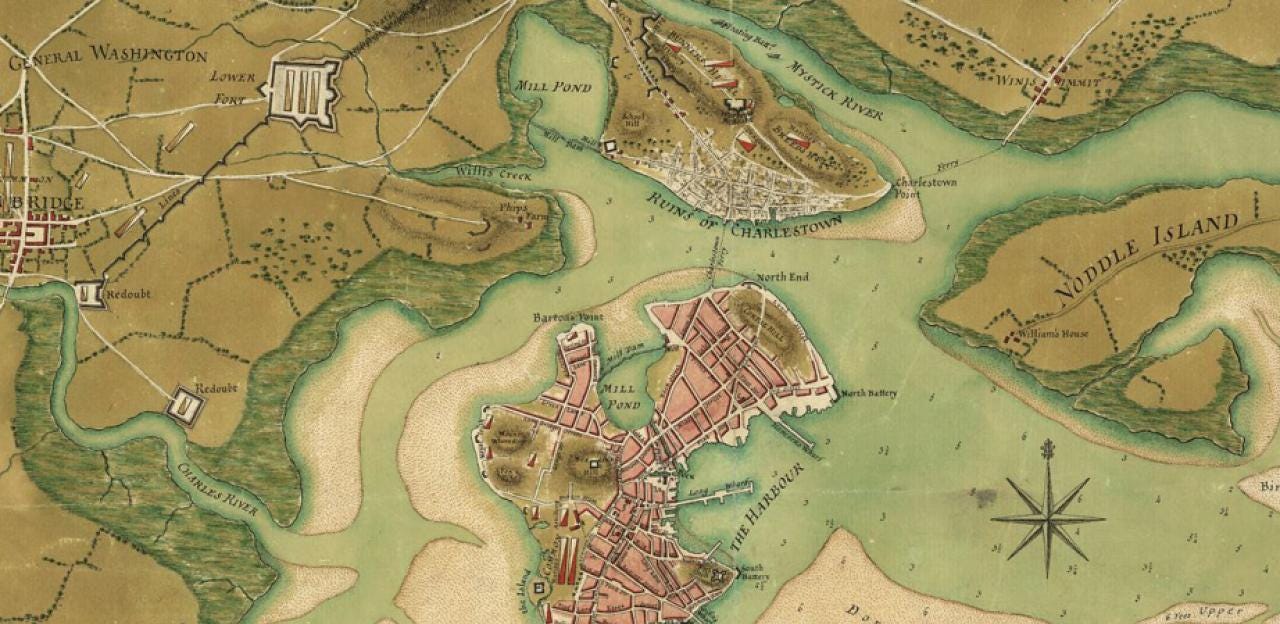If you are an American History buff, what battles do you think of when pondering the Revolutionary War? The incredible stand made at Bunker Hill? The rout of American Troops in New York? Washington crossing the Delaware on Christmas Day, 1776? Siege at Yorktown? The battles at Saratoga?. Maybe many others? One that is often overlooked is the Siege at Boston. It lasted from April 1775 to March 1776 and was an important Patriot victory in the early years of the War. It’s aftermath gave confidence to a fledgling nation that it had a shot to win the war. It also began sowing seeds of doubt about General William Howe, the military man in charge of suppressing the rebellious activities in the North American Colonies. (Technically Howe didn’t take over until after the siege, but he was there and had some level of culpability).
William Howe is an interesting character in the Revolutionary War. At the outset of the Rebellion, he privately held sympathies for the colonists and disagreed with how the British government was treating them. His brother, an admiral in the British Navy during the French and Indian War, was widely admired in the colonies and the Howe family in general admired America in many respects. However, he was summoned to the War by the Crown and he dutifully accepted. Of course, he was by no means a conscientious objector - he was a lifelong military man from a deeply respected military lineage. He was called to the colonies for a reason - he was one of the best military minds in the greatest military on the planet sent to crush a rebellion and find peace in an important asset for the British Empire. His presence across the Atlantic was very clear evidence that the British were taking the War for American Independence very seriously.
Despite that, however, during the Siege of Boston, he never wrote, in an official or personal capacity, about George Washington, the commander of the rebellion’s forces. Washington would have been known to Howe, as he was a respected military commander during the French and Indian War and he was fairly well established as the big cheese for the Colonies’ armed forces. But Howe did not spend any time thinking about him, his chief adversary, in what was effectively Howe’s first campaign at British head honcho. He didn’t think about what Washington’s strategy was, nor what his adversary could be up to across the Charles River.
Alternatively, Washington thought a ton about Howe, writing about him endlessly in personal and professional correspondences. Washington spent a large share of his time trying to figure out what the great British commander was thinking and feeling.
After defeat at Boston, during the New York campaign, Howe did show some signs of respect to Washington, by sending him a letter seeking reconciliation. However, the first couple of letters got sent back unopened, as they referred to Washington as “George Washington, Esq”. The second letter sent was “George Washington, Esq, etc. etc.”. It also got sent back. When asked for a reason, the Patriot messenger said there was no one in the Army with that title.
Howe stepped down as Commander of the British forces in 1777 after several important defeats. You know what the rest of George Washington’s career looked like.
Of course, the message here is pretty simple. Even if it appears they are paying tons of attention to you (the small-fry), the big bad empire (or corporation, or conglomeration, or well-established elite) is, in fact, not paying attention to you. Maybe it’s because these behemoths are too big to have attention spans. Or maybe it’s arrogance. Or some other version of survivorship bias. Or likely a mix of all those reasons and more. But the point remains - the goliath in your arena doesn’t know you exist. And even in the scenario where they know you exist, they still aren’t really paying attention to you.
And that’s a good thing.
It’s what makes this country great. We are founded on the idea that you don’t have to be a part of the elite to achieve great success. The examples of this are countless to the point of absurdity. It’s not just about underdogs either - what we care about is merit. Of course, we haven’t always been perfect in this endeavor, and we still have a long way to go before we get it absolutely nailed. But even the pursuit of improving our mechanisms for opportunity are unique to our great country.
We live in a land where greatness can come from anywhere.




